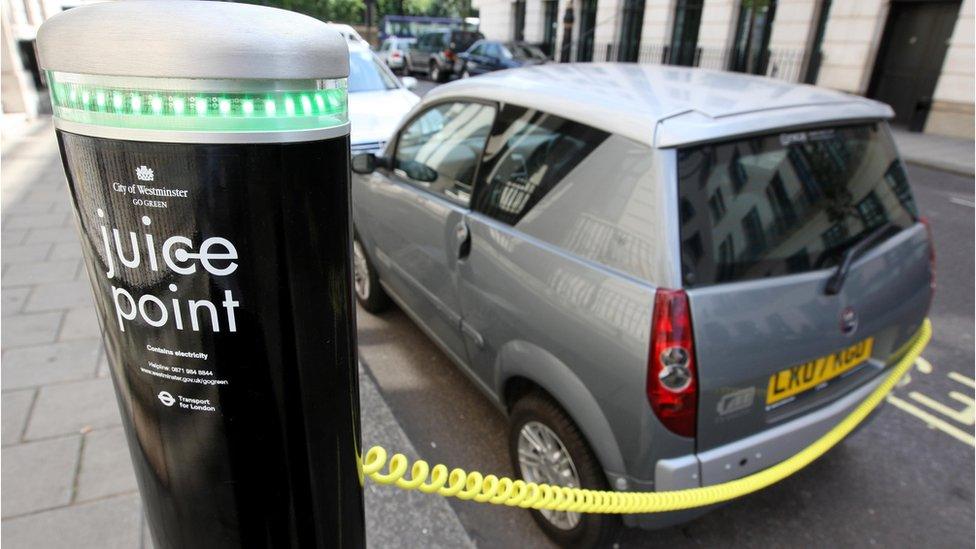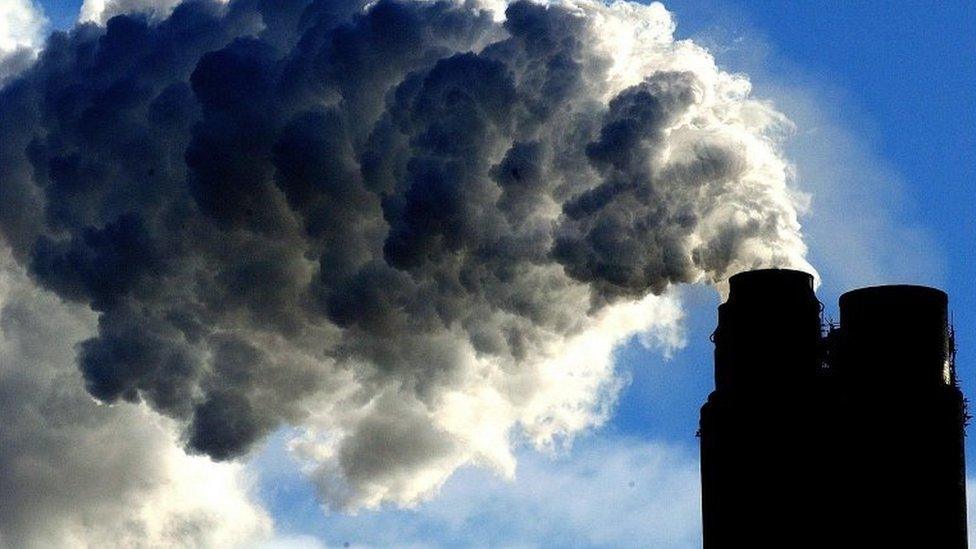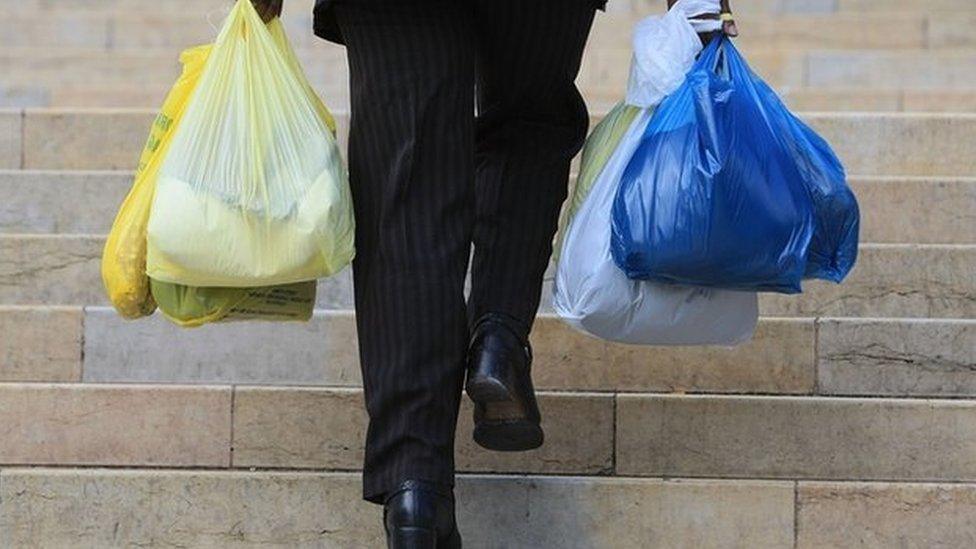Stigma of the Dump
- Published

Some questions for you. What are your clothes worth, and what percentage of them do you actually use? In the past year, say?
This may be made trickier if, like me, you have had little cause to look out anything for summer weather.
Here's another one. What is there in your house or garden shed that you could happily share with your neighbour, or several neighbours? A lawnmower or strimmer? A food mixer? Washing machine? A car?
Would you use a DIY tools library? Or a lending facility for toys?
And what could persuade you to give up the dream of a house in the country or suburbs in favour of something compact and mid-town, without a car?
Green dream
Maybe you're already living the green dream, but for most of us, these are the questions with which Scotland's policy-makers are wrestling.
They are aware that ambitious targets for reducing carbon emissions need a bit more than ambition. Scotland has repeatedly missed those targets.
Hitting them will require choices made by individuals and planners, some of them difficult. And we're heading towards the tricky bit where those choices have to be made.
So it's significant that the five main party leaders have signed up to a declaration, being pushed by a range of green and anti-poverty lobby groups, church groups and unions, which commits them to take climate change seriously in their manifestos for next year's Holyrood elections.
The declaration is quite a big ask of manifesto writers, not only in cost, but in who won't like it. To achieve those ambitious targets, low-carbon transport, energy efficient buildings and more of the Climate Justice Fund risks a counter-attack from the roads, construction and other business lobbies.

In the past two weeks, two interesting reports on the subject have been published. One was from the Scottish government, on making the move to a 'circular economy'. That's one in which resources are circulated, through re-use, recycling and repair, rather than single use for discard.
A consultation document is asking us how we think this could be achieved.
One way is to rifle through our belongings, to see what is unused or unnecessarily wasteful.
The answer to the clothes question I asked at the start is, says the Scottish government, £4,000 per average household, of which 30% is unused from one year to the next.
So one question is whether we buy less, or mend more, while getting into a much more active market for second hand or perhaps shared clothes.
Research is cited showing 72% of us would like to shop second hand, but only 23% do so.
Other research for Zero Waste Scotland estimates that 32% of goods reaching local authority recycling centres were reusable and that, with slight repairs, this could increase to 51%.
So there's the idea of encouraging more people to learn how to repair stuff. The arrival of 3D printing could help, a lot.
Tear down
The easy way to get big results is to do it in scale, with industry - either through regulation and tax, or ensuring the markets are there to make recycling and more efficient use of raw materials and supply chains in companies' financial interest.
Done at scale, the £40bn or so of spending on decommissioning all those North Sea platforms and pipelines - up to 500,000 tonnes of them - can be turned into a lot of new products. That's both a huge cost and a huge opportunity.
The aerospace industry is also well placed to recycle old planes. There was a plan kicking around to convert a Prestwick Airport hangar into a 'tear down' facility. That company was recently dissolved, though the idea could itself be recycled.
But one of the main ways of getting business to change is for consumers to make choices that emphasise product longevity, or to demand less packaging.

Making that kind of consumer choice the norm, and getting individuals to change behaviour, looks more challenging than shifting business.
Change is already afoot. Kerbside collections have decreased landfill, though there's a lot of contamination of quality potential by throwing so much into one or two bins.
There's a financial case. The 5p charge for a shopping bag in Scotland appears to have reduced demand for single-use bags far more than such a small fee would suggest if this were only about the money.
With public policy to clear parking space for city car clubs, it helps make city car clubs more attractive.
Low-car-use households - typically driving less than 7,500 miles per year - can save money. It's a small share of the car market for now, but the Financial Times warned car makers last week that it could grow quickly and lose them a lot of custom.
As Americans shed their second or third household car, a California study pointed to the average vehicle in a car-sharing scheme taking between nine and 13 sole-owner cars off the road. It pointed out that the average car is in use only 4% of the time.
Nudge nudge
But beyond financial self-interest, the vogue way to get change in public behaviour is 'nudge theory' - going with the grain, using subtle persuasion, appealing to people's sense of responsibility, community or self-interest, rather than challenges or lectures.
According to the Scottish government's consultation, the circular economy "could mean major shifts away from product ownership, to greater leasing or service-based models - for example paying a washing machine or dishwasher provider 'per wash' rather than actually owning the appliances.
"Service providers would have a clear incentive to maximise the lifetime of their products, making them more reliable, easier to repair and remanufacture."
(You could call it, say, a 'laundrette'.)
"There are also a number things we can all do today," it continues. "Most of us now recycle at home and work, but we can build on this and do more to re-use items or buy second-hand; to make things last longer by repairing them; or to purchase longer-lasting items in the first place.
"As 'active consumers', people can influence business by demanding more durable or better designed products."

The case for a lot more nudging as well as some big political decisions has been made by the Task Force for Low Carbon Infrastructure. This includes people from all aspects of infrastructure, advising the Scottish Government. As with the party leaders' declaration, this has a large green streak running through it, co-ordinated by WWF Scotland.
Last week, it published a study commissioned from Green Alliance think tank, pointing out that Scotland is "no laggard", but that its ambitious targets are going to need more effort.
Spending on infrastructure, it is urged, should all be calculated within a low carbon context. The proportion of capital spend that can be counted as low carbon should rise from 52% to 72%, if Scotland is to match similar countries.
It's not enough, it argued, to focus on transport, housing and waste. There's a need to think in every aspect of public spending, as well as a lot of private investment, about the carbon footprint of buildings and where they're located - to limit, for instance, the amount people have to travel.
Plugged-in future
The simple thinking requires a more complex approach - for instance, cutting commuting by letting people work from home, at least some days, needs some calculation of how much that pushes up the therm count for domestic heating.
'Decarbonised' heating is supposed to account for 11% of Scotland's heating needs within five years, up from 2.6% in 2011.
But even if the current plans were all implemented (which is unlikely, they say), that target won't be hit. Getting to 'largely decarbonised' heating by 2050 looks a big stretch.
Part of the problem highlighted is that infrastructure can be put in place without the human dimension. There can be plenty electric car plug-in points, and also tax incentives to go electric, but there's been little progress in getting public engagement and an expectation that this is our future transport.
Such has been the hostility to road pricing - paying more for busy roads at busy times - that it is rarely even mentioned as part of the debate on making transport costs more explicit, and behaviour more responsive to them.
These publications came just after the makers of Irn Bru announced that the recycling of bottles, with returnable deposits going back 110 years, is to be ended at the end of this year. Even with a 30p deposit, only around half were being returned to shops.
The 'glass cheque' that used to be handed to children as reward for taking the empties back just wasn't worth the effort. For all those ambitious targets, more effort is what's needed.